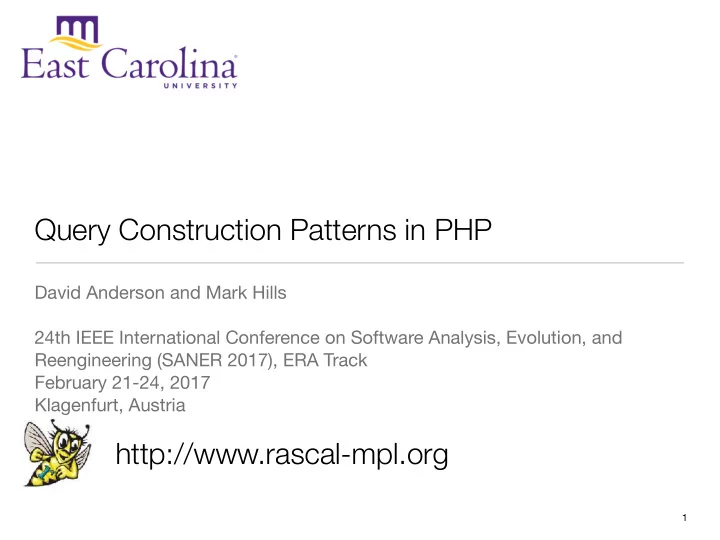

Query Construction Patterns in PHP David Anderson and Mark Hills 24th IEEE International Conference on Software Analysis, Evolution, and Reengineering (SANER 2017), ERA Track February 21-24, 2017 Klagenfurt, Austria http://www.rascal-mpl.org 1
Obligatory Cute Kitties!
Context: PHP and MySQL • Original MySQL API introduced in PHP 2 • Widely used • No support for object-oriented language features • No support for prepared statements, stored procedures • Deprecated in PHP 5.5, dropped in PHP 7 3
Our goal: program transformation! • We want to replace uses of MySQL API with either MySQL Improved (mysqli) or PDO, based on user preference • Want to move more towards features like prepared statements, provides better protection again SQL injection vulnerabilities (like this one!): $query = mysql_query(" SELECT title FROM semesters WHERE semesterid = $_POST[semester] "); 4
So, what’s the problem? • Safe transformations challenging in PHP! • Dynamic features, inclusion model, heavy use of strings and implicit type coercions all make this harder • So, focus our e ff orts: • Can we exploit common usage patterns? • What additional analysis do we need? • Do we hit a point of diminishing returns? Where? 5
Query construction patterns • How are queries typically built in PHP scripts? • What parts of a query tend to be dynamic? • What features are used to build these dynamic query parts? 6
Corpus & methodology • Starting small, see paper for details… • Analysis scripted in Rascal for reproducibility 7
Which patterns were found? • Literal query strings (QCP-1) • Cascading concatenating assignments (QCP-2) • Assignments distributed over control flow (QCP-3) • Dynamic query strings (QCP-4) 8
How often did they appear? • Literal strings: surprisingly often • Dynamic queries: most common • Most dynamic pieces are variables or array lookups • Several are function calls or ternary operations, but comparatively few • Almost all used as parameters • Other two: not very common (may mean patterns are too specific!) 9
What does this mean? • Assuming reasonable queries being built (an assumption we are still validating), results are encouraging — many dynamic parts used as parameters, others often variables or arrays versus unusual features • But, need more powerful analysis in general, especially to ensure soundness for transformations 10
Threats to validity • Results could be very specific to the selected systems • Some systems older, no longer maintained 11
Threats to validity • Results could be very specific to the selected systems • Some systems older, no longer maintained • Mitigation: focus on evolution, so older systems are normal; have included a variety of systems • Still an issue, though: a more extensive evaluation is ongoing 12
What have we learned? What’s left? • Queries appear to be built in predictable patterns • Dynamic parts are mainly in the “right” places, making a transformation to prepared statements possible • We need a more extensive analysis with more systems and more precise and sound analysis algorithms • We need better models of the queries themselves (current work) for more precise pattern identification • We need to build the transformation! 13
Questions for the audience • What about our results is unexpected, or would maybe be invalidated by a more extensive analysis? • What analysis are we missing? What should we add? • Do you think newer systems would show much di ff erent results? • Can you think of other applications (e.g., program comprehension) that we could apply this to? 14
Discussion Thank you! Any Questions? • Rascal: http://www.rascal-mpl.org • Me: http://www.cs.ecu.edu/hillsma 15
Recommend
More recommend